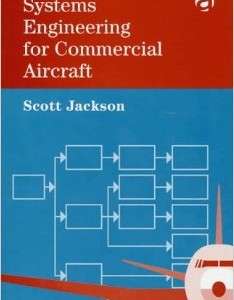Description
Systems Engineering for Commercial Aircraft
| Author | : Scott Jackson |
| Year | : 1997 |
| BookType | : Hardcover |
| ISBN | : 9780291398468 |
Systems Engineering for Commercial Aircraft (English) by Scott Jackson.
Description
Systems Engineering for Commercial Aircraft
- The key principle of systems engineering is that an aircraft should be considered as a whole and not as a collection of parts. Another principle is that the requirements for the aircraft and its subsystems emanate from a logical set of organized functions and from economic or customer-oriented requirements as well as the regulatory requirements for certification. The resulting process promises to synthesize and validate the design of aircraft which are higher in quality, better meet customer requirements and are most economical to operate.
This book is more of a how and a why guide rather than a what guide. It stresses systems engineering is an integrated technical-managerial process that can be adapted without sacrificing quality in which risk handling and management is a major part. It explains that the systems view applies to both the aircraft and the entire air transport system. The book emphasizes that system engineering is not an added layer of processes on top of the existing design processes; it is the glue that holds all the other processes together.
The readership includes the aircraft industry, suppliers and regulatory communities, especially technical, program and procurement managers; systems, design and specialty engineers (human factors, reliability, safety, etc.); students of aeronautical and systems engineering and technical management; and government agencies such as FAA and JAA.
- Contents: Preface; Introduction; Commercial aircraft; Functional analysis; Requirements and needs; Constraints and specialty requirements; Interfaces; Synthesis; Top-level synthesis; Subsystem synthesis; Certification, safety, and software; Verification and validation; Systems engineering management and control; Adapting systems engineering to the commercial aircraft domain; Large-scale system integration; Risk management; Resilience of the aircraft system; Final comments; Appendices; Bibliography; Glossary; Index.
- About the Author: Scott Jackson is a lecturer in Systems Architecting and Engineering at the University of Southern California. He is also Principal Engineer for Burnham Systems Consulting, currently working with Embraer in Brazil on systems engineering.
Scott received his BS degree in Aeronautical Engineering from the University of Texas in 1957 and an MS degree from UCLA in 1966 in fluid mechanics. He also holds an MA in Liberal Arts from CSU Long Beach. Scott is currently a PhD candidate in systems engineering at the University of South Australia.
Since 1965, Scott’s work has been dedicated to systems engineering, culminating in a focus on its application to commercial aircraft at Boeing. He is a Fellow of the International Council on Systems Engineering (INCOSE) and a Boeing Associate Technical Fellow in Systems Engineering. In 2006, Scott was awarded the Distinguished Engineer Award by Orange County Engineering Council.
- Reviews: ‘In this update Scott Jackson emphasizes and amplifies why systems engineering is critical for engineers and project managers, and how to apply it to developing modern commercial aircraft. His additional emphasis on organizational effects bridges the traditional gaps between engineering and project management and manifests the power of systems engineering to integrate across boundaries among products, services, people, and organizations.’
Ronald S. Carson, Missouri University of Science & Technology, USA and The Boeing Company (retired)
‘This book addresses the subject respecting the characteristics of each organization, always showing the advantages of implementing the SE focused on the results. Scott Jackson efficiently and objectively presents how to address the life cycle of the aircraft in a functional vision. He concentrates on the application of the vision of the development of the whole as distinct from the parts and furnishes an objective way to facilitate the understanding of the roles and responsibilities within the organization when using Systems Engineering.’ Wellington M. Oliveira, Systems Engineering – EMBRAER S.A.













Reviews
There are no reviews yet.